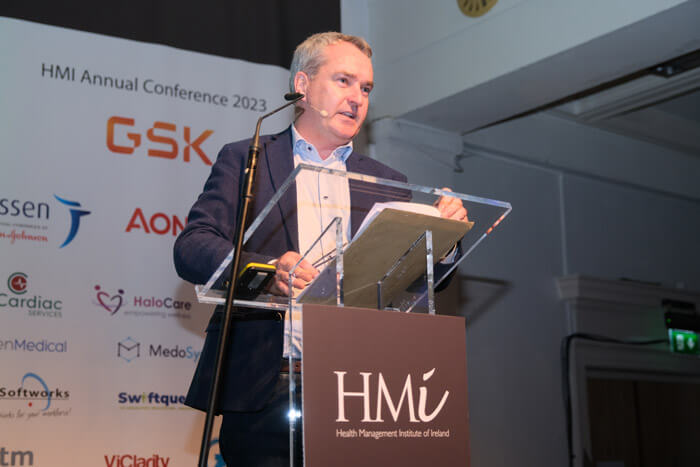
Mr. Robert Watt, Secretary General of the Department of Health, said he wanted to thank everybody at the Conference for the fantastic work they did to make public health services better for the people of the country, when he addressed the Conference.
“The jobs you do can be difficult and pressuring. Managing patient care, patient issues and budgets are very challenging and I want to thank you for your contributions and leadership.”
Looking back to the period of economic austerity, he said austerity had been a much better alternative to bankruptcy. People should not think politicians wanted to do unpalatable things because they liked it. They had made unpalatable choices because the alternative was bankruptcy. “We got through those time and we were resilient.”
The recent discussions on the financing of the health service had been interesting, he said. “There were articles telling us we hadn’t enough money for next year, while we were also being told the health service was inefficient and dysfunctional”.
Listening to the Dáil debate, he said he thought how we could do a much better job getting across our successes across to the public. Failure made headlines, but we needed to find a much better way of communicating what we are doing. For example, in the 12-month period up to June of this year, 3.6 million had outpatient appointments in the public system and there were 1.2 million day procedures. “We need to trumpet more about what we are doing, how we are treating more people and we have much improved outcomes, compared to 10 – 15 years ago. For example, the number of people surviving cancer is increasing. Our health system is delivering and continues to deliver and will deliver more in future. But we need to do a much better job in communicating this.”
Mr. Watt said we needed to do better with budget control. The acute budget had increased by 80 per cent since 2016, we needed to improve out budgeting control and make a better case for more funding. We needed reforms and innovations which reflected the inevitable changes taking place. Our population over the age of 65 had increased by 20 per cent since 2016. A priority now was community care. This was well resourced and we were beginning to see the benefits of it and should work tp build on our success in this area.
Mr. Watt said the regional health areas would actually improve the relationship between the community and the and acute system. We now had 37 treatment pathways for providing better care for patients at the right time and in the right place and some of the results were incredible and the impact on waiting lists was impressive. We needed to see how we could embrace and extend that work and deal with more patients. We needed to embed technology and really look at what we could do better in this area that would improve service for patients.
He said there was a very clear policy agenda with Slaintecare. “The great challenge for us all is to drive change and innovation and do better.
In reply to questions, Mr. Watt said it was critical for people to take more responsibility for their health and well-being. The whole issue around lifestyle, alcohol consumption and obesity was about better information, informing people, working with GPs. If people did not look after themselves they reduced their life expectancy and ended up in Emergency Departments.
On digitalisation, he said there were people at the Conference pushing for digital solutions which would have an enormous impact on patients “There is a lot happening, but we need to do better to enable us to care for more patients and improve patient outcomes. There is an issue about how we innovate. I think the biggest problem is around procurement. You cannot use public funds unless you have gone thought public procurement. I think there is a challenge in how we stay faithful to procurement rules, while encouraging new solutions.

